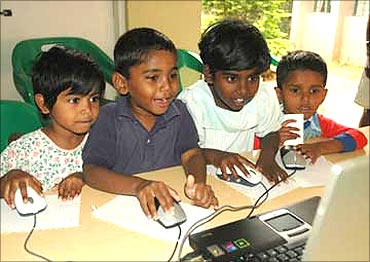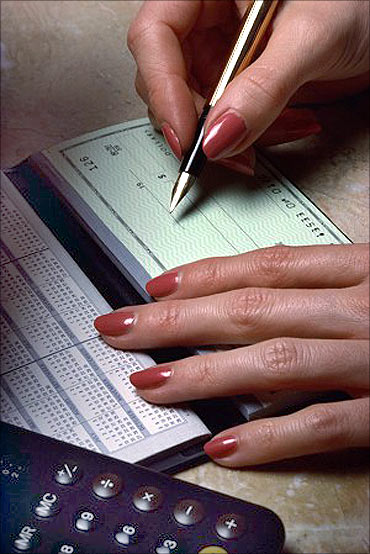 | « Back to article | Print this article |
How to make your child money clever
I was watching television the other day and one particular advertisement caught my attention the advertisement was for a retirement plan and the song in the background went 'sar uthake jiyo', inspiring individuals to lead an independent life even after they retire.
I got thinking about the right age to begin saving for the future. When should we start saving? How should one plan for the future?
Just like we inculcate good habits in a child, shouldn't we make our children money clever from a young age?
Isn't this the best time to develop their money habits that will help them through their lives? How can we do so? To get the answers, read on.
Click NEXT to read further. . .
How to make your child money clever
Get your child involved
To begin with, get your child involved in money matters of your home.
Whenever you are discussing your home budget or investments, savings or expenses -- include your child. This
will make your child aware of how you make ends meet. It will also develop their thoughts about savings and investing money for use in the future.
Open a bank account for your child
You can have a joint bank account with your child. Let your child manage the bank account. Encourage your child to deposit a part of his pocket money into his bank account.
You can also pay your child for running errands or doing chores around the house. Let your child make his own decisions regarding this money -- how much to save, where to invest and how much to spend.
You can give your opinions and help him along the way -- but he has to be the decision maker. It's a good idea to let your child learn from his mistakes. This will educate him.
Click NEXT to read further. . .
How to make your child money clever
Developing the habit of organisation
It is important that a child understands the importance of saving his money. So, when you ask your child to save a part of his income, you must also educate him as to why he should save. Savings can be for three reasons:
- To save for the future
- To fall back on in an emergency and
- To achieve some spending goal ( for example, if your child wants an expensive toy that does not fit his current allowance -- encourage him to draw a budget and save some portion of his money every month apart from his regular savings so that he accumulates enough to be able to buy that toy)
Click NEXT to read further. . .
How to make your child money clever
Your child should have his/her own income and spending chart or work sheet. Just like adults, they should be able to work out their cash inflows and outflows. You could use an illustration to help your child organise his/her finances.
| Items of Income | Rupees |
| Monthly Allowance | 500 |
| Car washing rewards | 50 |
| Setting dinner table rewards | 30 |
| Clean up room rewards | 20 |
| Gifts from friends / relatives/ grand parents | NIL |
| Total Income | 600 |
|
| |
| Savings |
|
| Deposit in Bank (20 %) | 120 |
| Deposit in Emergency fund (10%) | 60 |
| Total Savings | 180 |
| Items of expenses | |
| Movies | 150 |
| Restaurants | 120 |
| Petrol | 150 |
| Total Expenses | 420 |
The items could change as per the age of your child and his priorities
So if your child wants to spend more, he has to find a way to fit the expense in his budget sheet. Say, he wants to buy a branded shirt worth Rs 500, he has to either increase his income or spend less for a few months till he has a surplus of Rs 500.
So, if he forgoes going to the movies for 3 months and runs extra errands worth Rs 50 for one month, he will be able to buy the shirt. This effort will make him money conscience and organised about money matters!
Click NEXT to read further. . .
How to make your child money clever
Savings and Investments are important
The next step is to help your child invest his / her savings. Educate your child about growing their money by investing.
Make them aware of the options they have. Let them research avenues for themselves.
Here again you can guide them as to how to compartmentalise their savings. For example, you can chart out percentages of savings that could go in different investments:
| Investments | Percentage |
| Fixed Deposits | 50% |
| Mutual Funds | 30% |
| NSCs etc | 20% |
| Total | 100% |
Making your child money clever will help them develop their financial goals in life and of course lead a disciplined and independent life!
Powered by
BankBazaar.com is an online marketplace where you can instantly get loan rate quotes, compare and apply online for your personal loan, home loan and credit card needs from India's leading banks and NBFCs.
Copyright 2025 www.BankBazaar.com. All rights reserved.




